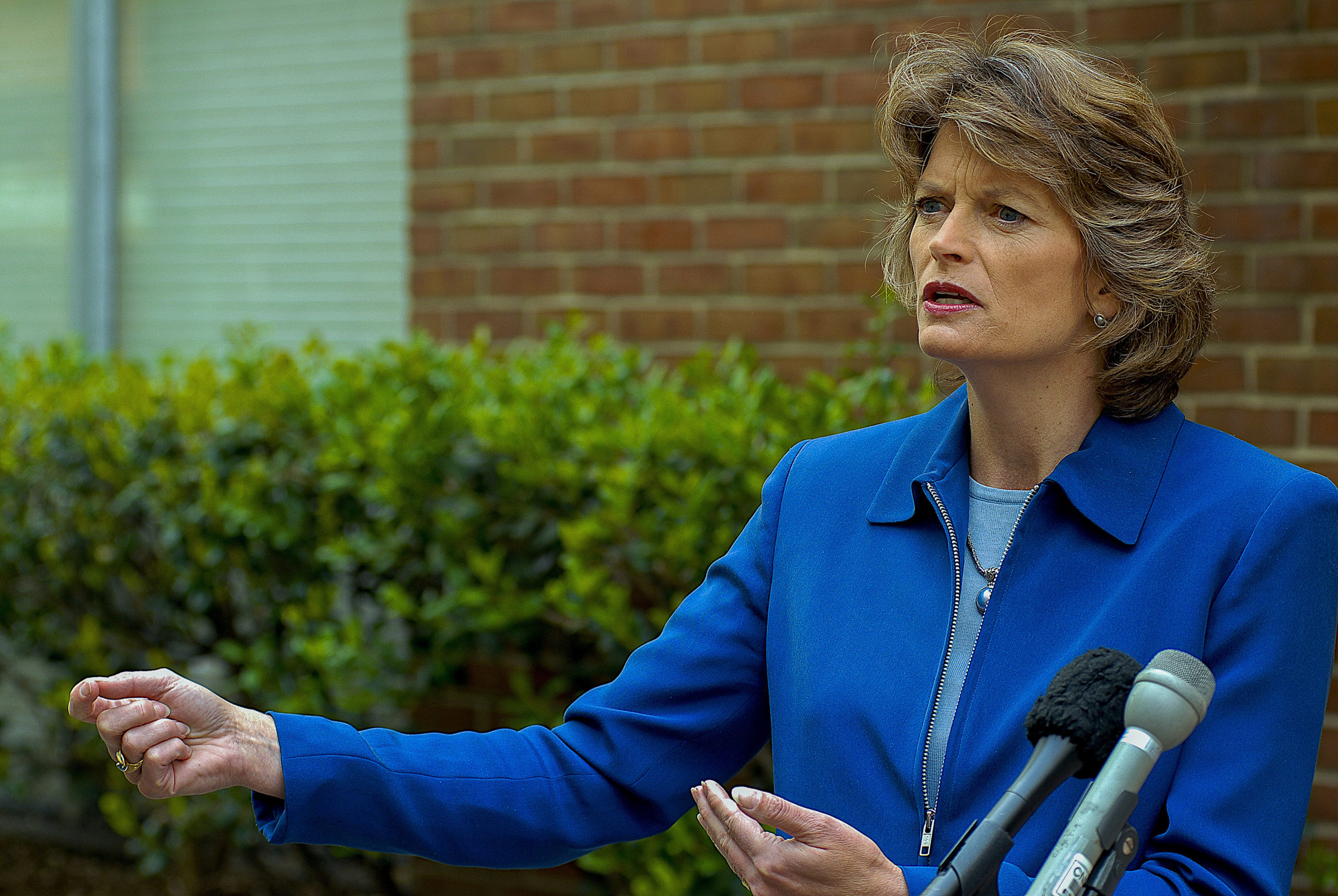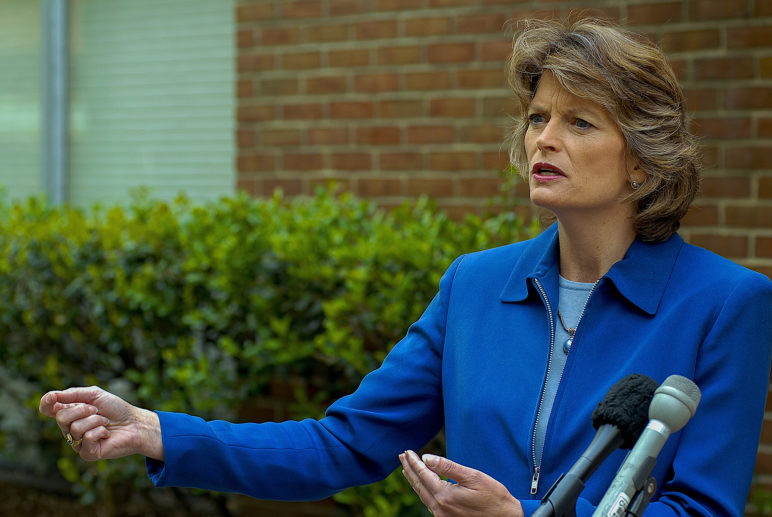Two days after pro-Trump extremists overran and trashed the Capitol, Senator Lisa Murkowski, an Alaska Republican, called on him to resign and signaled a willingness to officially break from the Republican party.
“I will tell you, if the Republican Party has become nothing more than the party of Trump, I sincerely question whether this is the party for me,” she told the Anchorage Daily News on January 8.
Murkowski is the Republican party’s version of a black sheep. She voted against the nomination of Brett Kavanaugh to the Supreme Court, for example, and frequently called out the former president for bad behavior. She is also pro-choice. Though she is a Republican from a red state, many of her supporters are moderates and Democrats. And so Murkowski has become a master of balancing party fidelity with key votes and impassioned statements that make liberals and moderates cheer. Her ability to go even further—demanding a presidential resignation and talking openly about leaving the Republican party—coincides with Alaska voters adopting new open primary and ranked-choice voting systems last November. Alaska’s election reforms grant Murkowski even more freedom to follow her conscience and be pragmatic.
When Murkowski comes up for re-election in 2022, Alaska’s new open primary format will send the top four candidates on to compete in the ranked choice general. Voters can then rank as many or as few of the top four as they wish. The first candidate to win a majority of active ballots wins the seat. The new system has essentially liberated Murkowski from the risk of being outflanked by extreme partisans in a closed party primary. That is, the type of Republican who supported former President Trump and propagates conspiratorial falsehoods. In an open primary, her moderate-conservative record will most likely win the broad support necessary for a spot on the general election ballot.
Murkowski is keenly aware of the dangers a closed party primary poses for her and other candidates who don’t always take their cues from party demagoguery.

Murkowski is keenly aware of the dangers a closed party primary poses for her and other candidates who don’t always take their cues from party demagoguery. In 2010, Tea Party candidate Joe Miller won Alaska’s closed Republican primary, eliminating Murkowski from the race. Undaunted, she ran a historic write-in campaign and won the general election by appealing to a broad cross-section of voters.
Moving to the ranked choice general election, Alaska’s many moderate and center-right voters will likely gravitate to Murkowski. More partisan voters who nonetheless tolerate Murkowski could still choose to rank her second or third. Under the ranked choice format, broader appeal stands a better chance of leading to victory than it would in the pick-one system.
On the Senate floor, the incentives created by Alaska’s new ranked choice voting election system should enable Murkowski to maintain more power than might be expected from a member of the minority. With Democrats holding only the slimmest of majorities in a highly partisan body, across-the-aisle consensus will be the only path for most legislation. Senators with the most freedom to shuttle between parties will be its greatest influencers. Murkowski, the rare moderate, is one of them.
“I’ll tell you who the real winners are,” US Senator Angus King, an Independent from Maine, recently told 60 Minutes. “People like Susan Collins and Lisa Murkowski, I hope myself, Joe Manchin. … We’re in the middle and can have an influence in both directions.” (Collins, a Republican, is Maine’s senior senator and Manchin, a Democrat, represents West Virginia.)
Murkowski was flexing new power afforded by ranked choice voting elections in Alaska when she made the comment about possibly leaving the Republican Party.

Murkowski was flexing that power when she made the comment about possibly leaving the Republican Party. And maybe it wouldn’t be a bad idea. Already Murkowski counterbalances Alaska’s staunchly conservative junior senator, Dan Sullivan. Murkowski could plausibly become an Independent, giving her what King calls the “luxury” of not having to do what either party says. Enhancing her freedom to make bipartisan deals could more effectively further Alaska’s interests with Democratic leadership and put her on the same footing as King, who is known in the Senate as “a truth teller and voice of reason.”
If Murkowski did go Independent, signs point to her caucusing with Republicans. The Senate’s two Independents, King and Sen. Bernie Sanders of Vermont, caucus with the Democrats, but Murkowski told Liz Ruskin of Alaska Public Media she has no plans to join the Democratic majority. She also told Ruskin she is not talking to Manchin, who calls himself “the most bipartisan member of Congress,” about forming a new centrist caucus. Alaska’s new election laws would make running outside the Republican party a relative breeze for Murkowski. She’d be free from the hassle of a write-in campaign and would avoid being forced into the role of third-party spoiler, as Independents often are.
Closed party primaries, plurality voting, and the other electoral structures America has built to uphold democracy paradoxically hand electoral victories to politicians, like Senators Ted Cruz and Josh Hawley, who face harsh bipartisan criticism for willfully disrupting democratic norms and sowing doubt about the 2020 elections. We must reform our election practices to better withstand such indiscriminate ambition and more often reward politicians who are pragmatic and principled. The leniency Congressional Republicans showed Trump bears this out. Following Trump’s incitement of violence at the US Capitol, Murkowski was one of just two Republican senators to call for his resignation, a remarkably low number given his egregious attacks on the legitimacy of election outcomes. And despite being reportedly “furious” with Trump, Senate Majority Leader Mitch McConnell and most other Senate Republicans are dragging their feet on an impeachment trial, fearing the primary backlash many could face in upcoming elections.
Politicians of all political stripes should not be afraid to defend democracy. And yet here we are. But there is hope. Alaska and Maine, the first states to adopt ranked choice voting, are leading the way in ensuring our elected officials are beholden to the broadest swath of their state’s voters, not the most radicalized. Other states should look north for inspiration and then do the same.
Sightline Institute is a 501(c)3 non-profit organization and does not support, endorse, or oppose any candidate or political party.
For press inquiries and interview requests, please contact Anna Fahey.












John Whitmer
Thanks for writing this piece. Your last sentence says it all: “Other states should look north for inspiration and then do the same.”
Let’s hope…
Debra J Morrison
Yay Alaska, yay Lisa Murkowski, and yay Jeannette Lee! Great illustration of how our current voting methods tend to prevent us from working constructively across party lines, and reward extremism. Along with RCV, which has broad support and a robust history, other jurisdictions have adopted the lesser known, but somewhat simpler, Approval Voting, which is another way to elect less extreme, more independent and bipartisan candidates. Fargo, ND and St. Louis, MO have recently adopted it for municipal elections.
John Abbotts
Thank you for writing this piece, Jeanette. I was thinking why four, and then it hit me. Now, before I get started, Sightline by its charter is non-partisan. I am under no such constraints as an individual, so I take full responsibility for what follows. There are already four parties by policy: Democratic Socialists [Bernie, The Squad, others in down-ballot elections such as Kshama Sawant], Corporate Democrats [who have been forced by Citizens United to seek some equity with other parties for funding and maybe forget their history of supporting working people], Recent Republicans [or Mastodons of the New Confederacy ala McConnell, Gingrich, Sase, you name them]; and maybe, if progressives are lucky, a new sliver of Right-Wing Bat-guano Rs [let’s call them hypothetically, Trump/Treason (and I use that word advisedly)/Greene with an E, QAnon, “Guns are us,” etc.].
Alan, Kristin, and maybe others at SL have written about the advantages of a parliamentary system, and the tendency of same to force consensus to reach a majority, in turn discouraging extreme results; and opposition parties can always call a “vote of no confidence,” which if it carries would result in a new election. So four parties and RCV could effectively make the US closer to a parliament, although as long as big money influences politics, the corporate rich may still dominate. Just saying,
Oliver
Really enjoyed this piece. Have you written anything about how the final four model is impacting behavior in Juneau?
Guest
“Under the ranked choice format, broader appeal stands a better chance of leading to victory than it would in the pick-one system.”
That’s not true. Not with the instant-runoff elimination method, anyway. Both the open primary format and the RCV with IRV elimination suffer from vote-splitting between similar candidates. If she has “broad appeal” but her competitors have polarized supporters, it’s likely she’ll get center-squeezed out of either stage of the election.
An open primary with approval ballots or a ranked-choice system with Condorcet tallying would be better if you want someone like her to win.